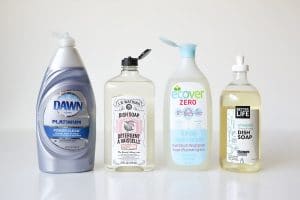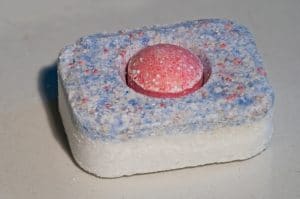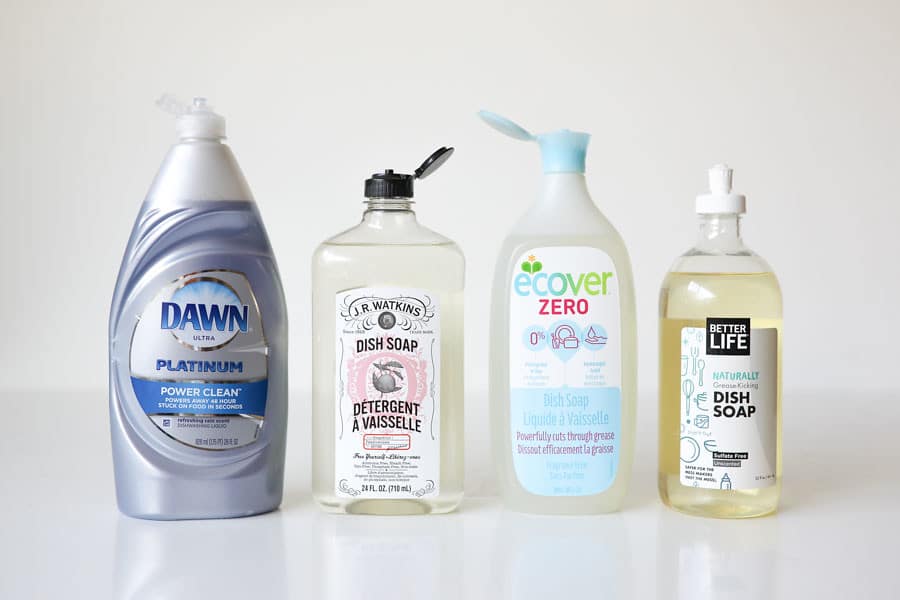At some point when using our dishwashers, we have thought about using regular dish soap. After all, aren’t all dish soaps manufactured to clean dishes and other cooking utensils?
Well, in this article we are going to discuss which cleaning detergent you should or shouldn’t put in your dishwasher.
Is It Safe to Use Regular Dish Soap in a Dishwasher?
The answer is NO. There is a reason why regular dish soap should be used on the sink and dishwasher detergent on your dishwashing appliance. The two should not be used interchangeably.
You are probably wondering why substituting regular dishwasher soap is a terrible idea. Well, for starters, ordinary dish soap is formulated to create a lot of foamy suds. Putting it in your washer will also result in the formation of suds which will overflow to your floor.

Using the wrong detergent on your appliance has disastrous consequences. The suds won’t only fill up your entire kitchen by escaping through the gaps in your machine but it can damage your dishwasher.
After an extended period of using regular dish soap in your dishwasher, your filters and pipes may clog affecting the entire drainage of your system.
If this is something that you have thought about doing, well you need to remove that idea from your mind. If you have already tried it, then you can testify on how disastrous the results were.
To thoroughly clean your dishes and ensure your machine works properly, stick to the recommended products.

What happens when you put regular dish soap in the dishwasher?
Still not convinced? Watch this video which shows what happens when you put regular dish soap in the dishwasher:
What Can You Use Instead of Dishwasher Liquid/Pods If You Run Out?
You have loaded your mugs, bowls, and glasses in your dishwasher, but just before you set it, you realize that you are out of dishwashing pods/liquids.
If rushing to the store just because of dishwashing liquid is out of the question, or you are simply low on cash, what do you do next? Here is a list of safe alternatives to dishwasher liquids.
1. Baking Soda
There is no doubt that baking soda is one of the most versatile products found in most homes. It can be used on a plethora of tasks.
Thanks to its gentle abrasive qualities, mixing it with some water to create a baking soda paste makes the best dishwasher alternative.
Fill it up in the detergent cup and run the cleaning cycle. Your mugs and bowls will be thoroughly cleaned and left odorless.
2. Distilled White Vinegar
Another excellent alternative is distilled white vinegar. It is known for cutting through grease on plates and cups. You can put it in one bowl on the top rack and let the water movement distribute it evenly inside the dishwasher.
3. Borax
This natural mineral element is a common ingredient in most dishwashing liquids. And it’s perfect for washing dishes. Fill the detergent cup with borax and let your washer do the magic.
4. Washing Soda
If you run out of dishwasher liquid, then you might consider washing soda. It is the best alternative for homeowners who have access to hard water.
5. Lemon Juice
It is a whole lot similar to vinegar. Lemon juice contains mild acid that can cut through grease and food particles in plates and bowls.
You can also use a mixture of baking soda and vinegar. Now that you are familiar with the best alternatives of dishwasher liquids, let’s also look at products that you should never use in a dishwasher even when you run out. They include;
- Regular dishwashing liquid
- Body wash
- Shampoo
- All-purpose cleaners
- Laundry detergent
Can I Use Drain Cleaner In A Dishwasher?
Drain cleaners are very thorough when it comes to removing dirt and stubborn particles in plates. But is it safe for you to use in your dishwasher? The answer is also no. Drain cleaners can severely damage your dishwasher.
The first victim will be the rubber lining inside your appliance. The toxic chemicals found in drain cleaners can also corrode other parts. It also leaves behind a residue that can attach itself to your dishes in future wash cycles.
When ingested this residue can be harmful to your health. Other than that, excessive use of drain cleaners can lead to leaks and mechanical issues such as the damage of drain hoses.
Can I Use Washing Up Liquid In A Dishwasher?
Not unless you want to swim in a kitchen full of bubbles, never use washing up liquid in a dishwasher. The water movement and heat contribute immensely to the formation of large volumes of bubbles.
And once these bubbles find their way through the spaces in your appliance, they can end up in areas such as electronic chambers and the damages can be costly.
If you find someone else who has already put washing up liquid in a dishwasher. The best course of action is to switch it off and remove as many bubbles as possible.
You should also analyze if some bubbles have found their way into the back of your appliance before switching it back on.
Can I Use Bleach In A Dishwasher?
You can use bleach in your dishwasher, however, only when cleaning it and not on the dishes. Bleach is a strong agent that can remove excess food particles and residue that has built up in your dishwasher.
To properly use bleach in your dishwasher, empty all utensils and dishes. Remove by hand any debris and particles that may have built up at the bottom.
You can use your fingers or a paper towel. Pour powdered bleach and run your dishwasher as you normally would. You can run another cycle with some vinegar to remove odors.
Can I Use Normal Salt in a Dishwasher?
You have probably come across many platforms praising how salt can improve the performance of your dishwasher and ensure it cleans properly if you use hard water. However, the salt being talked about here isn’t the regular one. It is known as dishwasher salt.
The problem with table salt is that it is too fine and instead of enhancing the washer’s performance, it can end up blocking the pipes. The reason we recommend dishwasher slat is because it’s granule size is larger and as a result, it dissolves slowly without blocking the softener unit.
It works by providing sodium to the ion exchange resins found in the softener. As a result, attracting and trapping the magnesium ions found in hard water.
For homeowners that struggle with their dishes not being thoroughly cleaned because of hard water, dishwasher salt can put an end to this.
What Can I Use As A Rinse Aid In My Dishwasher?
Minerals, especially those found in hard water can make it hard for your dishwasher to clean glasses and keep your cutlery shiny. That is where the role of a rinse aid comes in. It eliminates spots and film from accumulating on your dishwasher through a sheeting action that removes water from your dishes during the rinse cycle.
There are lots of commercial rinse aids in the market that you can use. You can also easily create a homemade rinse aid that will effectively remove droplets of water containing minerals. All you need is alcohol, vinegar, and some citric acid.
The mixture of these three ingredients will ensure your plates are sparkling clean. The citric acid will remove scum and hard water stains. The vinegar will break up lime deposits and finally, the alcohol will quickly evaporate water spots and streaks.
To prepare a homemade rinse aid, take a container and pour 2 tablespoons of citric acid with ½ a cup of rubbing alcohol, ½ a cup of white vinegar, and 3 drops of food coloring.
The latter ingredient is to give it color so that you can see it through the compartment window, however optional.
After doing so shake the container gently so that the citric acid can dissolve completely. Using rinsing aid at least once a month can ensure your dishes, cups, and bowls are crystal clean.
Can I Use Vinegar As A Rinse Aid In My Dishwasher?
There is no harm in using vinegar as a rinse aid. However, this depends heavily on the type of water you use.
It’s quite frustrating when after opening your dishwasher, you are met by cloudy plates that are far from sparkling clean. Vinegar, as mentioned earlier does a great job at breaking lime deposits.
But when using vinegar as a rinsing aid, you will have to use a different approach, if you intend on using it by itself. Putting vinegar directly in the compartment gasket can break down the rubber and hoses. Also, if combined with salt, metal pans and bowls can be discolored.
The best way to use vinegar as a rinse aid is by putting it in a bowl and placing it at the top of your rack. This will allow the vinegar to reach all utensils and dishes in the washer while not interfering with the functioning of your appliance. Also, consider using only white vinegar because it is more environmentally friendly and gently to your washer.
Final Thoughts
Be it 10 years old or just brand new from the manufacturer, you should be very careful about what you use in a dishwasher.
And we are not just talking about soap but also the rinse aid, bleaches, and even homemade cleaning agents. By using the right products, you will keep your dishes sparkling clean while enhancing the performance of your appliance and stretching its life expectancy.
